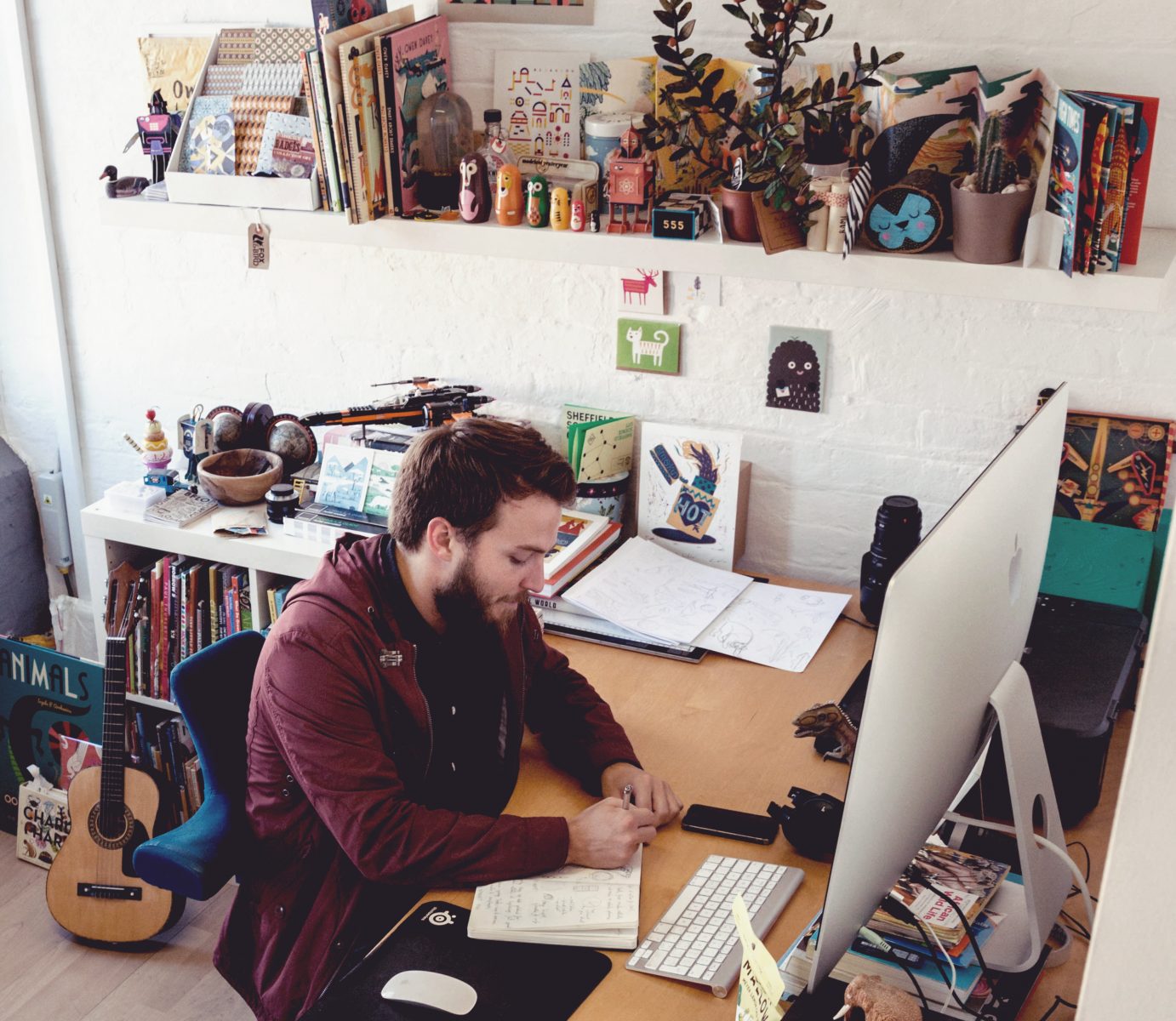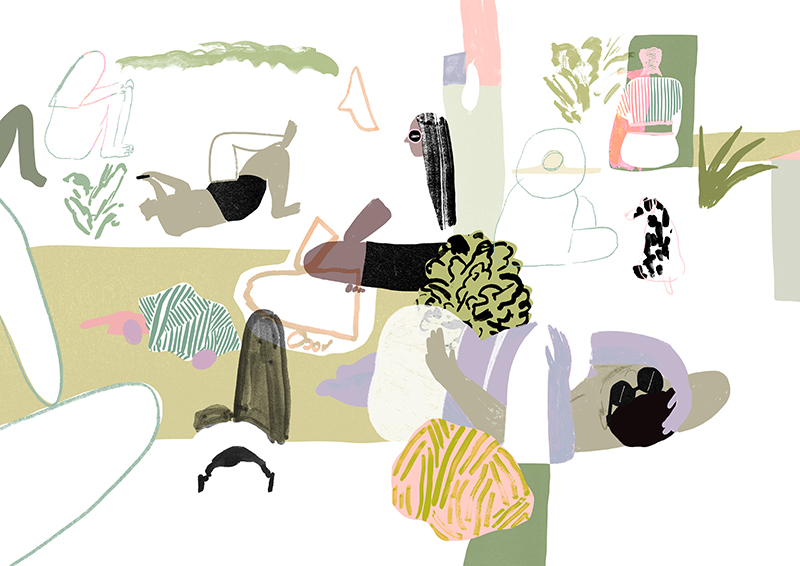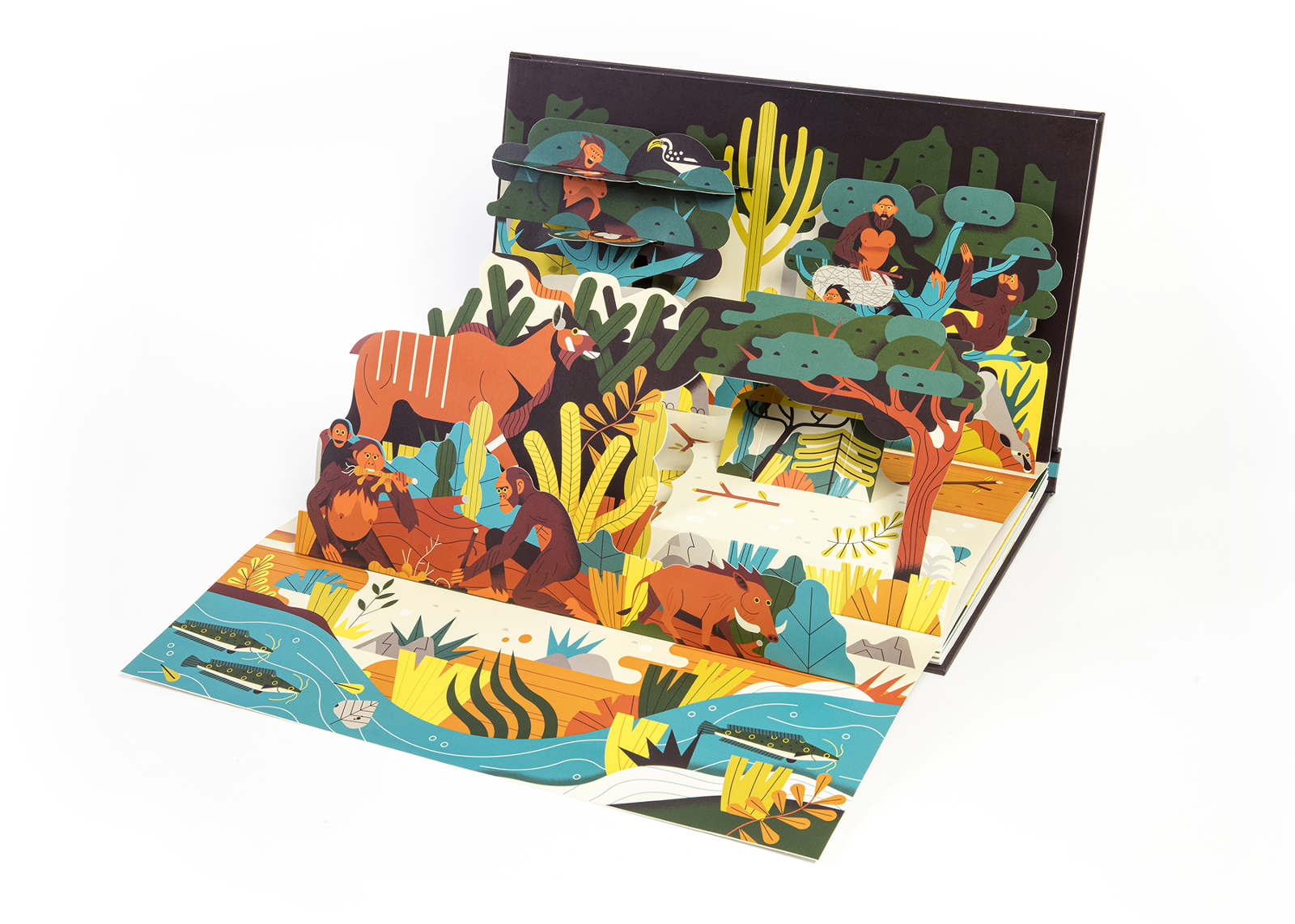Working Spaces: Lucy Sherston & Owen Davey
Illustration is a varied industry full of different visual styles and business practices, and we Illustrators’ working spaces can be a wonderful encapsulation of their individual professional habits and processes. Some work from home, some from studios, and some in completely remote places! We found ourselves craving to dig deep, and set out to discover why different practitioners choose different environments to grow their careers.
We inaugurate this new series of articles by interviewing AOI Members Lucy Sherston and Owen Davey. They both have tasted what it’s like to work from home and from a studio space, and share their experiences in both.
How has your current workplace benefitted you and your practice?
Owen Davey: I now have two young children, and working from home again gives me the flexibility of being able to help out whenever I’m needed.
Lucy Sherston: I feel like I have much more balance since moving into a studio. Working around other people who are all getting on with their own practice has given me more focus and I do more in the time I’m there. It’s also made me take the business side of things more seriously – knowing I have an extra financial cost, I’ve started to do more in the way of putting myself out there.
What made you decide to seek a studio space?
LS: I’d been working from my bedroom since I graduated 6 years ago and I’d sometimes thought how nice it would be to work in a shared space, but mainly the idea scared me. I suffered with social anxiety – and working from home allowed me the control I felt like I needed. What I didn’t realise was that spending so much time on my own was actually making it worse.
About a year ago I started working part-time for a surface pattern design studio. It took me a while to get used to it, but I found working around other people really beneficial. It kind of astonished me the amount I got done during office hours compared to working at home! It was a bit of a wake-up call about how I could use my time better, and made me realise that it was the right time to find a studio for my freelance work.
What distractions do/did you find (if any) working from home?
OD: The distractions of kids being the maniacs that they are (and my youngest daughter’s obsession with pulling out the charging wire on my laptop if I’m working in the living room) means that I’m not as efficient as I could be in the house. I’ve always been very self-motivated though, so there’s not much of an issue with getting work done. Throughout the distractions, music helps me focus.
LS: At home, I’d spend so much time finding things to do around the flat. I’d thought that this was all part of my process – that the procrastinating was necessary. Don’t get me wrong! I think procrastination can provide inspiration, but most of the time this hindered me rather than helping.
Run us through a typical working day – how do you organise your tasks? Do you try to stick to a 9 – 5 schedule?
Morning
OD: I wake up whenever my body feels done with sleep, getting ready for the day and then getting stuck into work.
LS: I start the morning by writing a list with what I’d like to get done that day. I’m a bit addicted to feeling like I’ve accomplished something, even if it’s small, so I’ll put as much as I can on the list in order to cross it off for maximum achievement points (ding ding). I tend to organise things in terms of priority – but I’m aware I also work best first thing in the morning, so if there’s something I can hit the ground running with I’ll tend to do that.
Lunch
OD: During my lunch break I hang out with my partner and whichever of my kids are awake.
LS: I’m really lucky the studio I’ve joined is only 10 minutes from my flat so I walk home for lunch. Having this little walk I think also clears my head and gives me a chance to refocus on what I need to get done that afternoon.
Afternoon
LS: When I’m back in the studio I’ll try and work on something different to what I was doing in the morning. I think breaking away from what you’re working on for a little bit allows you to return to it with fresher eyes.
OD: I get back to work again until 6 (sometimes earlier), when we start the bath time and bedtime routine, so I get a bit of time to hang out with the family again.
Night
OD: I have dinner and an evening with my partner and then when she goes to sleep, I do some more work until I get too tired and call it a night.
LS: I do try to stick to a 9-5 unless I have a deadline that requires staying late.
What challenges can you find in working in a studio? How do you go about it?
LS: If you live in a city where rent is already expensive, paying rent for a studio can feel financially inconceivable. If you can give yourself a time limit and say ‘Well I can afford the rent for the next 2 months and then I’ll evaluate my situation’ then, if you’re anything like me, in the time you’ll have been there your productivity will be making the rent worth it, and either way you’ll know if working away from home is something that works for you and if you want to pursue it.
What challenges can you find in working from home? How do you go about it?
OD: I currently don’t have a dedicated space to keep my work stuff where the kids can’t come and pull it apart, so it’s not ideal for being organised. My current space for working is carved out of space in the converted attic where we live, so I’m surrounded by camping gear and guitar cases. It’s far from ideal.
So we are building a studio in the garden of our new house which is purpose built and will have a huge desk and plenty of bookshelves, etc. It’s going to be well insulated and have natural indirect sunlight so that it’s nice and light, but doesn’t shine on my computer screen or cause sun damage to my books and prints.
For Illustrators seeking a studio space, where can they look?
I actually found the one I’m in on Instagram when they were advertising a desk space; it turned out it was run by a friend of a friend which I imagine is often the case when you’re in a creative circle in your city – so I think keeping a lookout and asking friends is a good shout. I’d also keep an eye out on Gumtree.
Many thanks to Lucy and Owen for taking part in our interview! See more of their work:
And while you’re here, help us out – we’re compiling a listing of studio spaces in the UK. If you know of a space you’d like us to include, let us know!
Back to News Page





